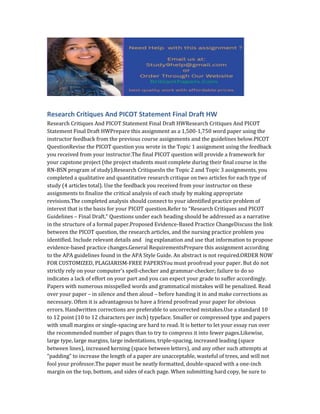
Research Critiques And PICOT Statement Final Draft HW.docx
- 1. Research Critiques And PICOT Statement Final Draft HW Research Critiques And PICOT Statement Final Draft HWResearch Critiques And PICOT Statement Final Draft HWPrepare this assignment as a 1,500-1,750 word paper using the instructor feedback from the previous course assignments and the guidelines below.PICOT QuestionRevise the PICOT question you wrote in the Topic 1 assignment using the feedback you received from your instructor.The final PICOT question will provide a framework for your capstone project (the project students must complete during their final course in the RN-BSN program of study).Research CritiquesIn the Topic 2 and Topic 3 assignments, you completed a qualitative and quantitative research critique on two articles for each type of study (4 articles total). Use the feedback you received from your instructor on these assignments to finalize the critical analysis of each study by making appropriate revisions.The completed analysis should connect to your identified practice problem of interest that is the basis for your PICOT question.Refer to “Research Critiques and PICOT Guidelines – Final Draft.” Questions under each heading should be addressed as a narrative in the structure of a formal paper.Proposed Evidence-Based Practice ChangeDiscuss the link between the PICOT question, the research articles, and the nursing practice problem you identified. Include relevant details and ing explanation and use that information to propose evidence-based practice changes.General RequirementsPrepare this assignment according to the APA guidelines found in the APA Style Guide. An abstract is not required.ORDER NOW FOR CUSTOMIZED, PLAGIARISM-FREE PAPERSYou must proofread your paper. But do not strictly rely on your computer’s spell-checker and grammar-checker; failure to do so indicates a lack of effort on your part and you can expect your grade to suffer accordingly. Papers with numerous misspelled words and grammatical mistakes will be penalized. Read over your paper – in silence and then aloud – before handing it in and make corrections as necessary. Often it is advantageous to have a friend proofread your paper for obvious errors. Handwritten corrections are preferable to uncorrected mistakes.Use a standard 10 to 12 point (10 to 12 characters per inch) typeface. Smaller or compressed type and papers with small margins or single-spacing are hard to read. It is better to let your essay run over the recommended number of pages than to try to compress it into fewer pages.Likewise, large type, large margins, large indentations, triple-spacing, increased leading (space between lines), increased kerning (space between letters), and any other such attempts at “padding” to increase the length of a paper are unacceptable, wasteful of trees, and will not fool your professor.The paper must be neatly formatted, double-spaced with a one-inch margin on the top, bottom, and sides of each page. When submitting hard copy, be sure to
- 2. use white paper and print out using dark ink. If it is hard to read your essay, it will also be hard to follow your argument.